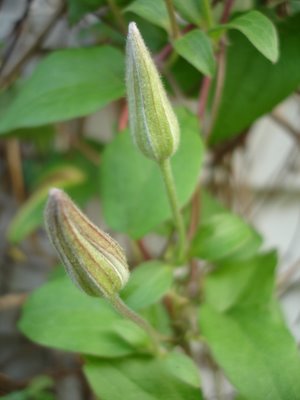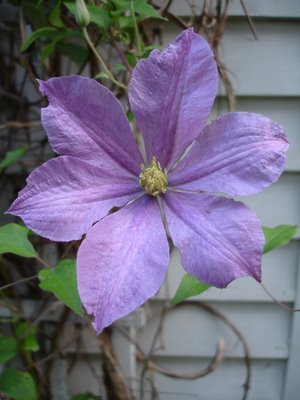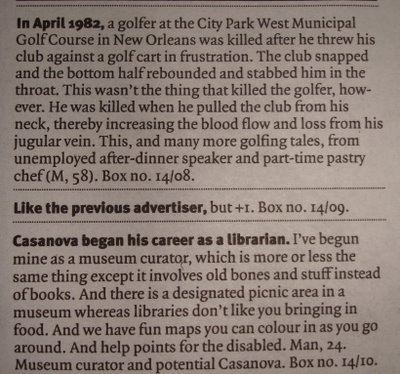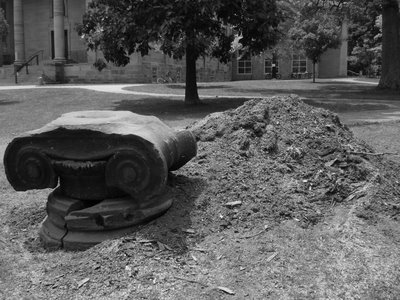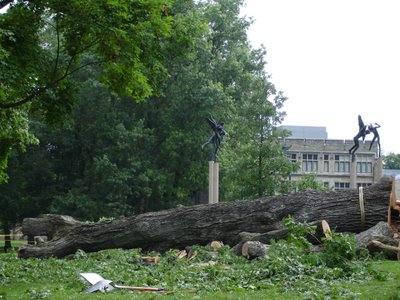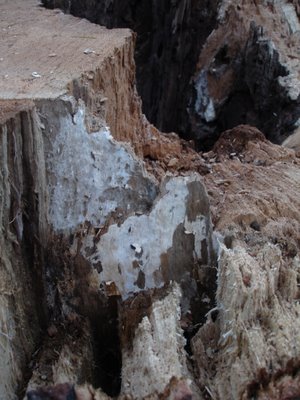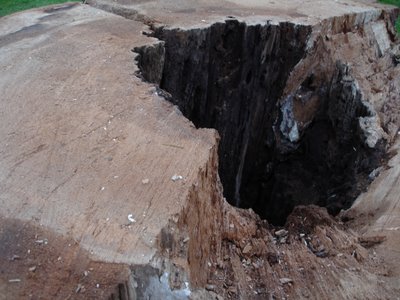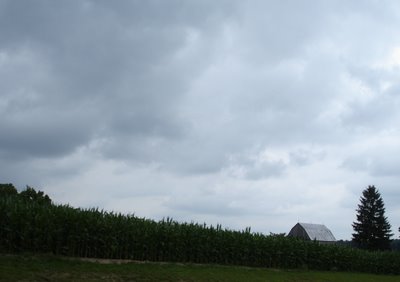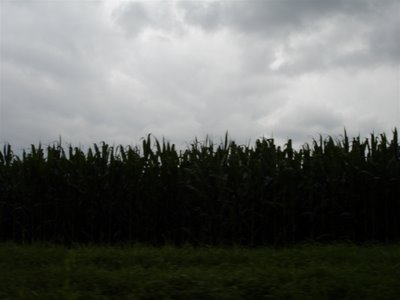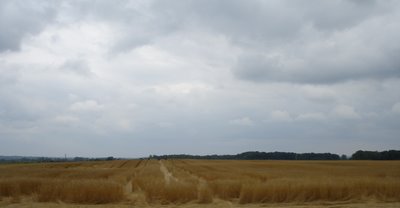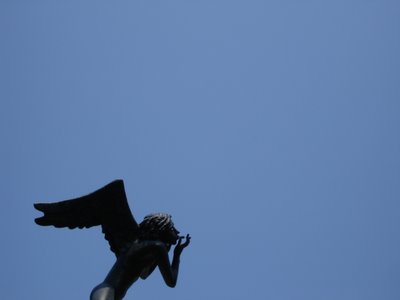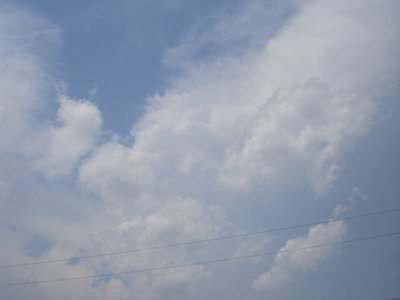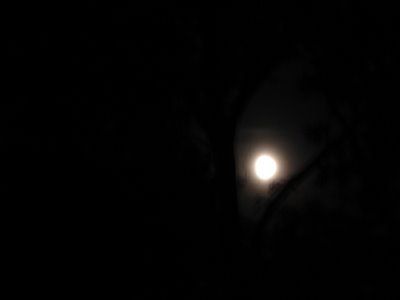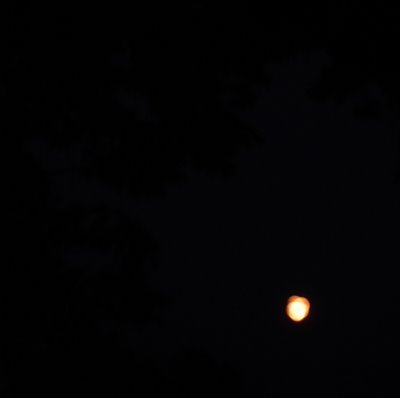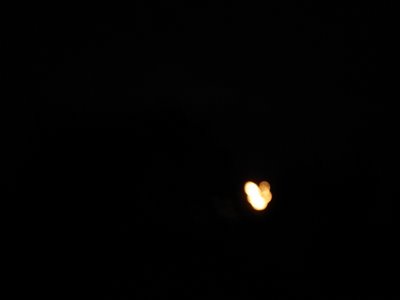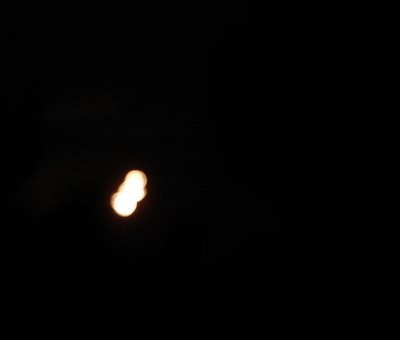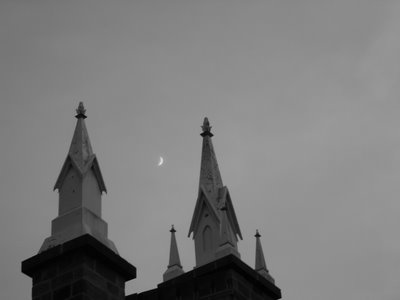
Sometimes my photographs are just a day behind. Last night, I went out for one of my two-mile evening walks (from one end of campus to the other and back again), and among the things I saw were the little spires on Old Kenyon, the dorm crowning the south end of campus, with a waxing moon behind them. I didn't confine myself to carrying only myself, as I sometimes do on such walks; instead I took my new Defunct shoulder bag, full of the books I'm wanting to read (or finish) now that my brain has a little more space to itself again. (Mentioning the bag makes me remember how much I've been wanting to tell you about my favorite internet retailers this spring, in case you're in the mood for something super chic. Check out Fancy Jewels (whence came the almost-matched pair of rings of which I wear one half), Superhero Designs (whence comes excitingly cool beaded jewelry, from an exceptionally friendly jewelry-maker), and Rebecca Haas (who produces simple, lovely silver and gold pieces; one of her Loop necklaces was a thirtieth birthday present to myself and has barely been off my neck since April). I'll shill for these women since they've helped keep me feeling cool this year, and maybe you want to feel cool, too. Not that we don't all have our own ways of feeling cool. Mine happen to include wearing jewelry made by friendly creative people, apparently.) But on the walk I ended up focusing mostly on what was around me anyway, despite all those books. I tried getting you a picture of the sea of fireflies into which I sank on the large lawn at the end of campus. I was not so successful, so I'll leave you to imagine it: blue dusk, a long spread of green (those of you who live near Prospect Park will have no difficulty imagining), the insistent, syncopated blinking of insect lights.
Today has been another day for regrouping, resettling, recentering, chiefly in the interests of moving back to the scholarly business of the summer, now that I've done the pedagogical business. Putting things that way makes them sound separable, which they certainly are not; the summer class I've just finished had as much scholarly value to me as nearly anything I've done in the past three years. But my brain--and I don't know if every academic's brain is like this--can only do so many different intense tasks in any given day, and what ends up happening to me is that I work extraordinarily well in either scholarly mode or teacherly mode on any given day. What this means is that I've been off of scholarly mode for several weeks. Quite happily so, I'll reiterate. But now I'm just as happy to feel myself turning back.
Of course, things have gotten a little bit more complicated on my scholarly production front over the past six months or so, as my other writing has stepped up--first these pieces, then the longer-scale works I started imagining these pieces could become, then the shorter-scale fictional pieces that started ekeing out early this month, and now, suddenly and strangely, the poetry that is whipping and ripping from me, congealing in my walking moments and my downtimes, clambering for the page the moment I have a minute to spare. It is so extraordinary a thing, this poetry-writing, that I'm devoting what time I have left before the power cuts out (we are in a thunderstorm), or before I decide I'm done for the night, to writing about it.
For the first few days I was writing it again, I was keeping count, as you know if you're keeping score at home. A poem! A second poem? A third? A fourth... A fifth, oh a fifth, and look, look what I can do, as I swing into my favorite meters, the ones I've always loved to read aloud and talk about, and look how my meters match my matter. Somewhere after the fifth, I stopped counting. Friday I started a new notebook just for writing poetry. I only got a few lines into this latest piece before I switched to the computer, but watching my pen play out words and lines, scratching, smoothing, sculpting, was such a thing. And to sit copying another poet in the bookstore last night, tracing not just what made me sense but also what made me think about how to write out my own senses--this is also such a thing. My young poet friend said to me the other day that he's been surprised how quickly my ear has turned into a mouth. My other poet friend wrote today to say, yes, isn't it strange how, when one starts to write, everything changes, just everything, about how one relates to literature and to language itself.
This morning and early afternoon, I watched and absolutely loved Sherman's March (1986), about which one of my soon-to-be-Chicagoan friends has written beautifully, in a piece that inspired me to see the movie with simply its first line: "Ross McElwee's Sherman's March may be the most convincingly lovelorn movie I have ever seen." He's right (I mean, not that I can compare it to all the movies he's seen; I'm just saying that I also found it amazingly, convincingly lovelorn, and startlingly profound). You should see it. My favorite sequence of McElwee's voiceover narration comes about two-thirds of the way through the film, when he explains the relationship between his filming and his living. For this bit alone, I might try to teach an autobiographical film course:
It seems I’m filming my life in order to have a life to film, like some primitive organism that somehow nourishes itself by devouring itself, growing as it diminishes…. I’m beginning to lose touch with where I really am in all of this. It’s a little like looking into a mirror and trying to see what you really look like, when you’re not really looking at your own reflection.
I don't think that I'm yet at the point where I'm living life in order to have poems to write; I know that I've only rarely gone out in search of things to write in this forum, and when I have, it's tended to be an exercise that has crystallized something crucial about the day. Which is all a long way of saying that even if I do start living for the poems, I'll feel all right; there are worse things I could be living for.
But some things have indeed changed, as both my poet friends have suggested: I'm taking poetry into myself in a different way than I have in the past; I'm eating it now as a different kind of fuel--again, not just for what it's saying, and not just for appreciating how it's saying, but now for thinking about which techniques feel right for my ear and desires. My excellent novelist friend said to me a couple of weeks ago that if I reach sestinas, he and others will stage an intervention; but he also said, trust your process. My excellent poet friend says, just keep going; think of it like the uncurling frond of a growing fern.
I started thinking of it as being like having a new limb that I had to learn to use, bit by bit; now I'm thinking of it as having new eyes, not unlike the way keeping these writings and images felt like having new eyes. But it is also true that I feel as though I've picked up a new tongue, even in some literal ways; the summer class probably involved a higher degree of spoken eloquence than any class I've taught so far, simply because I'm tuned in to words in a way that's different than what I've known before.
After I watched Sherman's March--and this upcoming bit is really the reason I mentioned the movie in the first place--I decided to take another of my reading baths, and so in I tumbled with Pilgrim at Tinker Creek, which, you may recall, I picked back up in earnest while I was in Lexington this March, doing the first version of the hiatus project. This early afternoon, I didn't make it very far with Dillard because her prose sounds to me so familiar that it's as though I run into myself and have to say hello again, every few lines. Today, I'm reading Chapter Seven, "Spring," which Dillard starts with an anecdote about having once believed that all languages were simply code for English. By the fourth page of the chapter, she's on to beauty as a language, and I'm hooked (as if I hadn't been already):
Beauty itself is the language to which we have no key; it is the mute cipher, the cryptogram, the uncracked, unbroken code. And it could be that for beauty, as it turned out to be for French, that there is no key, that "oui" will never make sense in our language but only on its own, and that we need to start all over again, on a new continent, learning the strange syllables one by one. (107)
Writing again, and especially writing poetry again--for I used to do it, long ago, but it was someone else's voice speaking that work most of the time--makes me feel as though I'm figuring out anew how to figure out the speaking and spelling of beauty. And for these lessons I am so grateful; you have no idea.

By the way: my title tonight comes from Joanna Newsom's "This Side of the Blue," from The Milk-Eyed Mender (2004), another gift of a recommendation from the friend who turned me on to Sufjan Stevens. (This few weeks, in short: a trove, musically and otherwise. If April is the cruellest month, June must be the most capacious.) If you're a folk-pop fan and don't know Newsom, you might want to check her out; her m.o. is quirky vocals over excellent harp. Her voice is either going to grate on you immensely or charm you silly--or else it might seem, initially, as though it's going to make you crazy but then resolve itself into something you'll like a great deal. I'm a fan of her lyrics more than almost anything else: "I have read the right books to interpret your looks: / You were knocking me down with the palm of your eye," in "Peach Plum Pear"; "Do you want to sit at my table? / My fighting fame is fabled, / and fortune finds me fit and able" in "The Book of Right-On." I wouldn't choose her over Sufjan, if I could only pick one of them. But fortunately we don't always have to make such choices. The lines from which the title comes: "And the signifieds butt heads with the signifiers, / and we all fall down slackjawed to marvel at words." How can you not love?

